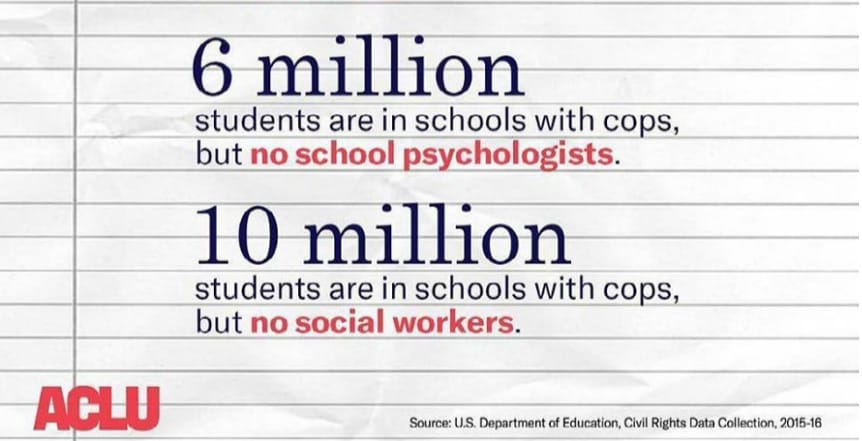The School-to-Prison Pipeline and Mental Health
BIPOC students face unequal disciplinary action in schools.
BIPOC students face unequal disciplinary action in schools. Black students represent 39% of students suspended from school despite composing only 15.5% of all public school students. Schools are more likely to suspend and expel Black and Brown youth than White youth. This is referred to as the “school-to-prison pipeline.” Police presence, zero-tolerance discipline, and lack of adequate resources in schools are also factors.


Get the facts straight.
The Juvenile (In)justice System
BIPOC youth with mental health issues are also more likely than White youth with the same issues to be sent to the juvenile (in)justice system instead of being sent to get care. Once in the juvenile (in)justice system, BIPOC youth are less likely to be treated for mental illness than white youth. Trauma as a result of prison conditions and treatment while imprisoned can directly impact mental health.
Criminalization* of Mental Health
It’s no surprise, then, that prisons and juvenile detention centers in the U.S. are filled with people suffering from mental illness. There are many reasons for this, including a lack of access to mental health care, criminalization of mental illness, and racism that exists in both the health and legal systems. Families of people who are imprisoned are also affected. For example, they might have lost a main source of income, which can take a toll on their mental health.
We Can Stop the School-to-Prison Pipeline
Through policy advocacy, we can demand expanded access to quality mental health care and resources in schools. Money used for school police could be diverted to hiring mental health professionals (and especially mental health professionals of color) to provide needed support to students.This would help more youth avoid interactions with police.
*Mental health and addiction are some of the only health issues criminalized in the United States. It is estimated that 900,000 people with mental illness end up in jails every year.
How are you feeling after reading this?
- 🤷
- 😊
- 💯
- 😔
- 😠
- 🤔
Key Stats
Over 70% of youth in the juvenile justice system have a diagnosed mental illness. [source]
- Youth in detention and correctional facilities are almost 10 times more likely to suffer from psychosis than youth in the general population. [source]
- Children of incarcerated parents are at increased risk for both “internalizing” (experiencing depression, anxiety, or withdrawal, for example) and “externalizing” (through delinquency or substance use, as examples) their behavior problems, cognitive delays, and difficulties in school. [source]

Resources
Take Action Now
Explore Related Action Area
Continue your engagement by learning more about and taking action on related issues.
Racial Justice & Mental Health
Crisis response & policing, the school-to-prison pipeline, intergenerational trauma and other inequitable conditions.
BIPOC Mental Health Workforce
The mental health workforce needs more diversity and training on cultural humility.
Crisis Response & Policing
Many counties deploy police for a mental health crisis even though they aren’t appropriate responders.
The School-to-Prison Pipeline and Mental Health
BIPOC students face unequal disciplinary action in schools.
Healing from Intergenerational Trauma and Racism
Racial justice is dependent on healing.
Restorative Justice
Rooted in indigenous practices, restorative justice focuses on building relationships.



